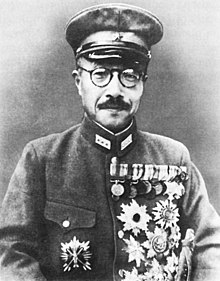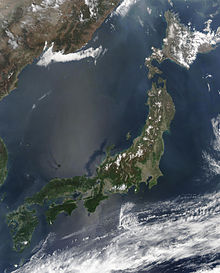Hideki Tōjō
Japanese politician, army officer, and convicted war criminal (1884–1948)
Hideki Tōjō (December 30, 1884 – December 23, 1948) was a general in the Imperial Japanese Army, a nationalist thinker, and the 40th Prime Minister of Japan.



Quotes
edit1940s
edit- If one of you should detect any dissatisfaction or unsettled feeling within your (the governors’) jurisdiction, you should take immediate and concrete steps for the complete removal of these elements … Now the people of our nation must endure our little punk of an emperor and their inconveniences and overcome painful hardships in order to win this war.
- Broadcast speech, as quoted in Fourth International Vol.5 No.2 (February 1944).
- The moment the first American soldier sets foot on the Japanese mainland, all prisoners of war will be shot.
- Note signed by Tojo (June 1945), left at a camp during the Bataan Death March. Possible forgery since Tojo was no longer in power for over a year at the time of the discovery. Also, the Japanese homeland was not threatened with invasion at the time and it was common sense that the Philippines would be attacked before.
- It is natural that I should bear entire responsibility for the war in general, and, needless to say, I am prepared to do so. Consequently, now that the war has been lost, it is presumably necessary that I be judged so that the circumstances of the time can be clarified and the future peace of the world be assured. Therefore, with respect to my trial, it is my intention to speak frankly, according to my recollection, even though when the vanquished stands before the victor, who has over him the power of life and death, he may be apt to toady and flatter. I mean to pay considerable attention to this in my actions, and say to the end that what is true is true and what is false is false. To shade one's words in flattery to the point of untruthfulness would falsify the trial and do incalculable harm to the nation, and great care must be taken to avoid this.
- Written in his prison diary, as quoted in The Imperial Japanese Army: The Invincible Years 1941–42 (2014), by Bill Yenne, Oxford, United Kingdom: Oxford Publishing, p. 337.
- When reflecting upon it today, that the Pearl Harbor attack should have succeeded in achieving surprise seems a blessing from Heaven. It was clear that a great American fleet had been concentrated in Pearl Harbor, and we supposed that the state of alert would be very high.
- Written in his prison diary
- Despite Japan's desires and efforts, unfortunate differences in the ways that Japan, England, the United States, and China understood circumstances, together with misunderstandings of attitudes, made it impossible for the parties to agree. Up until the very end, these were important reasons for the outbreak of war, and from Japan's point of view, this is a matter of great regret.
- Prison journal
Quotes about Tōjō
edit- The preference of the Navy Staff was to launch assaults on Hong Kong, Singapore and Malaya, while at the same time overrunning Dutch Sumatra, Borneo and Java. Their assumption, which proved entirely correct, was that the European empires in Asia had been dealt lethal blow at home by the German occupation of the Netherlands and France and the continuing German threat to the British Isles. The Dutch colonies, in particular, looked like easy quarry; they had the added allure of being oil-rich. Malaya, meanwhile, was the world's biggest producer of rubber. Living space for Japanese settlers was all very well, but the Japanese Empire needed strategic raw materials far more urgently. In 1940 army planners had argued for an invasion of Indo-China, to provide new bases from which to attack the Chinese Nationalists in Sichuan. As War Minister in the new Cabinet formed by Prince Konoe in July 1940, Tôjô had insisted that unless Japan struck soon, she risked being too late. By 1941, it is true, some senior generals had become less enthusiastic about this idea. But by now the proponents of the Southern strategy had the upper hand.
- Niall Ferguson, The War of the World: Twentieth-Century Conflict and the Descent of the West (2006), pp. 484-485
- The Japanese followed a very resolute tactic in unleashing this conflict. They simply pounced on the enemy that wanted to strangle them and attacked him. I trust that the Japanese still have a few things in reserve; for they generally pursue very cautious, traditionally conservative policies; they will not negligently risk their empire, and they surely have a whole series of military options, about which even we know nothing. They did not inform us in advance of their intention to attack suddenly, and this was also necessary to maintain the secrecy of their plans. All these events are still rather unclear for the time being. But the war is a fact. Tojo was more dependable after all than we had assumed at first. The Führer and the whole headquarters are overjoyed at this development. We are now at least temporarily secure from a serious threat. In the coming weeks and months Roosevelt will no longer be as insolent as he has been in the past. Now this war has become a world war in the true sense of the word.
- Joseph Goebbels, 8 December 1941 diary
- There was little public sympathy for Tōjō in Japan in the post-war period. His responsibility for the war, his oppressive regime, and his failure to commit suicide turned him into a notorious figure. Later revelations about his personal integrity, impeccable family life, devotion to duty, and loyalty to the emperor somewhat improved his image.
- Professor Ben-Ami Shillony, Hebrew University of Jerusalem, in The Oxford Companion to World War II (1995)
- I had an uneasy feeling he might plead his own cause against indictment as a war criminal. There had been considerable outcry from some of the Allies, notably the Russians and the British, to include him in this category. Indeed, the initial list of those proposed by them was headed by the Emperor's name. Realizing the tragic consequences that would follow such an unjust action, I had stoutly resisted such efforts. When Washington seemed to be veering toward the British point of view, I had advised that I would need at least one million reinforcements should such action be taken. I believed that if the Emperor were indicted, and perhaps hanged, as a war criminal, military government would have to be instituted throughout all Japan, and guerrilla warfare would probably break out. He played a major role in the spiritual regeneration of Japan, and his loyal co-operation and influence had much to do with the success of the occupation.
- Douglas MacArthur, as quoted in The Imperial Japanese Army: The Invincible Years 1941–42 (2014), by Bill Yenne, Oxford, United Kingdom: Oxford Publishing, pp. 337-338.
- Most dangerous of all, it was the product of a leadership where the military focused on winning battles and the civilians had given little thought to what happened after that. That limited vision is more common in war than one might think. The Germans in 1914 had not worked out their war aims or what they would do if France and Russia sued for peace. In September 1941, as Japan moved closer towards war with the United States, a high-level imperial war conference took place in the presence of the emperor, key civilian and military leaders and elder statesmen. The military, which by now dominated policy-making, produced a document of breathtaking vagueness on its goals in the coming war. ‘We cannot exclude the possibility,’ it said, ‘that the war may end because of a great change in American public opinion … At any rate we should be able to establish an invincible position … Meanwhile, we may hope that we will be able to influence the trend of affairs and bring the war to an end.’ The Japanese prime minister, Tojo Hideki (who was later tried for war crimes), shortly afterwards compared the decision to jumping off a cliff with one’s eyes closed. ‘There are times when we must have the courage to do extraordinary things.’ Asia, the Americans and the Japanese people paid a heavy price for that sort of courage.
- Margaret MacMillan, War: How Conflict Shapes Us (2020)
- Japan Forms Alliance With White Supremacists in Well-Thought-Out Scheme: From the East Asian Correspondent, Sept 1, 1939. — In a course of action praised by many as "far-sighted" and "tactically brilliant," the Japanese government has sworn its allegiance to the Axis powers led by white-supremacist Nazi Germany. In a formal statement, Japanese leaders declared, "We wish to be counted among the loyal allies of this back-stabbing, racist hate nation." Following the announcement, Japanese General and military leader Hideki Tojo told reporters, "We are pleased to enter into an alliance with the paranoid, xenophobic government of Nazi Germany. We anticipate a deeply enriching exchange of our military aid with their deep-seated hatred of our non-white heritage."
- "Japan Forms Alliance With White Supremacists in Well-Thought-Out Scheme" a satirical false history article in Our Dumb Century (1999) by The Onion.